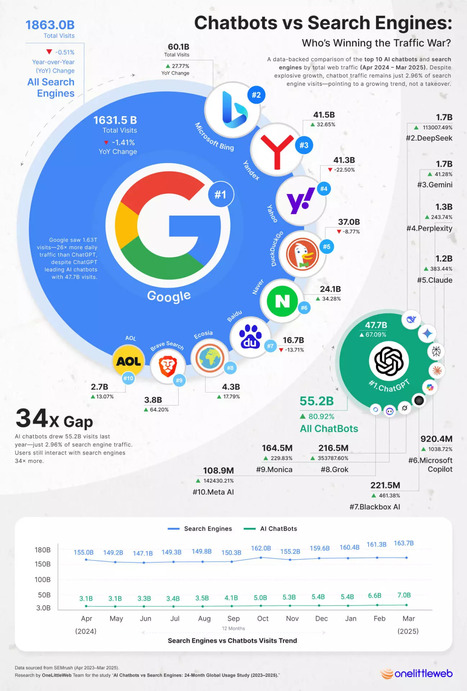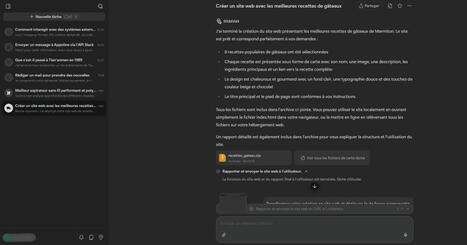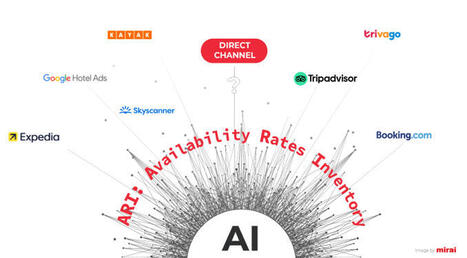 Your new post is loading...
 Your new post is loading...

|
Scooped by
Roland Schegg
June 13, 5:29 AM
|
"At Skift Research, we think travel leaders need to be a little Google-obsessed. It’s one of the most important drivers of bookings, and our data shows Google is undergoing a real-time AI transformation with massive implications for the industry.
Google has been a critical part of the tourism marketing funnel for decades. Now, as the search giant reinvents itself for the AI era, the downstream impact on the entire travel industry could be dramatic.
Skift Research’s latest research report – AI, Google, and the Shift from Keywords to Context in Travel – tracks how Google is embedding AI tools into its search platform and what it means for travel marketers. "

|
Scooped by
Roland Schegg
June 10, 3:26 AM
|
Google’s rapid shift toward AI-powered search is upending the travel marketing landscape faster than expected. Once a stable pillar of the tourism booking funnel, Google is now rolling out generative AI features—like Gemini’s AI Overviews—that fundamentally alter how travelers discover and engage with travel brands. Skift Research’s latest report reveals that the move from keyword-based to context-rich, conversational search is no longer a future scenario—it’s already here. With AI-generated content now appearing in a growing share of flight and hotel searches, travel marketers face an urgent need to rethink SEO, content strategy, and advertising models.

|
Scooped by
Roland Schegg
June 10, 1:15 AM
|
Depuis que la firme OpenAI a lancé sa plateforme ChatGPT en novembre 2022, il s’en trouve plusieurs pour annoncer la mort imminente de Google. Il est vrai que l’IA générative devient de plus en plus populaire et utilisée par un nombre croissant d’utilisateurs à l’échelle mondiale. C’est encore plus vrai chez les plus jeunes générations, qui ont délaissé les moteurs de recherche traditionnels pour favoriser les médias sociaux (TikTok, Instagram, YouTube) et les modèles de langage élargis, tels que ChatGPT, Gemini, CoPilote, Claude, Mistral ou Perplexity.

|
Scooped by
Roland Schegg
June 9, 5:18 AM
|
The 155-page report, “The Gig Trap: Algorithmic, Wage and Labor Exploitation in Platform Work in the US” focuses on seven major companies operating in the US: Amazon Flex, DoorDash, Favor, Instacart, Lyft, Shipt, and Uber. These companies claim to offer gig workers “flexibility” but often end up paying them less than state or local minimum wages. Six of the seven companies use algorithms with opaque rules to assign jobs and determine wages, meaning that workers do not know how much they will be paid until after completing the job.

|
Scooped by
Roland Schegg
June 6, 7:44 AM
|
Manus est une intelligence artificielle censée être capable de travailler en autonomie et d'effectuer des tâches complexes. Mais qu'en est-il vraiment ? Nous avons testé cet agent IA !

|
Scooped by
Roland Schegg
June 5, 6:14 AM
|
Airbnb’s new Services feature - offering extras like massages and private chefs - may appeal to guests but is sparking backlash from hosts. Critics say Airbnb profits from services carried out in host homes without offering compensation, control, or proper consent. The move raises concerns about fairness, liability, and the erosion of trust between Airbnb and its host community.

|
Scooped by
Roland Schegg
June 4, 2:57 PM
|
What is abundantly clear from the presentations by Google CEO Sundar Pichai and colleagues such as DeepMind’s Demis Hassabis is that the world is rapidly moving away from traditional search engine results toward an artificial intelligence (AI)-enabled future.
The use of Gemini has exploded over the past year, Pichai revealed: The Gemini app now has over 400 million monthly active users, and 7 million developers are building with Gemini—five times more than this time last year. The Gemini ecosystem is now processing 9.7 trillion tokens a month—50 times more than in 2024.
The travel sector needs to move fast to recognize the transformational changes that are happening as a result of some of the I/O announcements.

|
Scooped by
Roland Schegg
June 4, 12:00 PM
|
The hospitality industry is seeing tangible benefits from digital transformation. A Deloitte survey found that 57% of hotel operators reported significant revenue growth directly attributable to technology-driven service improvements.
For global hotel groups like Accor, these advancements underscore the urgency of investing in digital tools to enhance service quality, modernize loyalty programs, and even unlock new revenue models. To that end, Accor is leveraging AI, digital innovation, and a dynamic distribution strategy to deepen customer engagement and drive business growth at scale.

|
Scooped by
Roland Schegg
June 4, 5:56 AM
|
Bootstrapping is a statistical metric that uses random sample replacements. That’s not for me, so bootstrapping also has a broader slang meaning that most people get. It means you are stuck or at least unable to take big strides to alleviate or remove the problem that is literally at your feet. In the hotel world it’s the operational technology stack that has us all bootstrapped. That’s what this piece is all about. How we find ourselves in this predicament and how we might be able to literally run away from it.

|
Scooped by
Roland Schegg
June 3, 12:04 AM
|
In an era where artificial intelligence is reshaping consumer behaviors, Expedia Group is proactively transforming its approach to travel planning. Jochen Koedijk, Expedia's Chief Marketing Officer, outlines the company's strategy to integrate AI technologies, aiming to streamline the journey from travel inspiration to booking. By leveraging partnerships with leading AI platforms and enhancing internal capabilities, Expedia seeks to remain at the forefront of the evolving digital travel landscape.
Key takeaways
Embracing AI-driven search: Recognizing the shift from traditional search engines to conversational AI tools like ChatGPT and Microsoft's Copilot, Expedia is adapting its services to align with these new user behaviors.
Innovative social media integration: Expedia is testing features that allow users to send social media content, such as Instagram Reels, to the platform. The AI then identifies the location and provides travel planning options, bridging the gap between inspiration and action.
Strategic partnerships: Collaborations with OpenAI and Microsoft have positioned Expedia as a launch partner for emerging AI tools, ensuring early access and integration into evolving technologies.
In-house expertise development: To swiftly adapt to the rapidly changing AI landscape, Expedia is investing in building robust internal marketing and AI capabilities.
Navigating AI-enhanced search engines: With Google's introduction of AI Overviews via its Gemini model, Expedia is analyzing traffic patterns to optimize performance, noting that while traffic may decrease, conversion rates could improve due to more qualified leads.
Collapsing the marketing funnel: Koedijk envisions a future where AI streamlines the consumer journey, reducing the steps from discovering travel inspiration to making a booking, thereby enhancing user experience and efficiency.

|
Scooped by
Roland Schegg
May 29, 6:17 AM
|
Dario Amodei — CEO of Anthropic, one of the world's most powerful creators of artificial intelligence — has a blunt, scary warning for the U.S. government and all of us:
AI could wipe out half of all entry-level white-collar jobs — and spike unemployment to 10-20% in the next one to five years, Amodei told us in an interview from his San Francisco office.
Amodei said AI companies and government need to stop "sugar-coating" what's coming: the possible mass elimination of jobs across technology, finance, law, consulting and other white-collar professions, especially entry-level gigs.

|
Scooped by
Roland Schegg
May 29, 5:03 AM
|
Booking.com could soon face damages claims worth millions of euros as 26 national hotel associations across Europe prepare to support litigation against the company. This follows a significant ruling by the European Court of Justice, which found that Booking.com's price parity clauses - contractual restrictions that prevent hotels from offering cheaper rates elsewhere - may reduce competition, though they are not automatically illegal under EU law. The ruling has reinvigorated long-standing grievances among hoteliers about the platform’s pricing power.

|
Scooped by
Roland Schegg
May 28, 5:29 AM
|
At the Preferred Global Conference 2025 in Singapore, a standout panel on social media and travel marketing revealed a powerful shift in how influence and commerce now intersect. Far from being just a top-of-funnel inspiration channel, social media today drives full-funnel engagement — from discovery to booking — through experimentation, community, and creator-led storytelling. Panelists, including TikTok's Eason Zhang, influencers, OTAs, and platform founders, emphasized that the new travel customer journey is nonlinear, dynamic, and deeply personal.
Key takeaways
The travel funnel is dead. long live the pinball: The traditional linear funnel has been replaced by a chaotic, bouncing customer journey. Travelers pinball between TikTok, Instagram, Reddit, Google, and even ChatGPT before booking. Social media isn’t just a top-of-funnel tool anymore — it’s embedded throughout the decision-making process.
TikTok drives discovery, but threads builds community: While TikTok still drives brand visibility, creators like Amira Rahmat find Threads delivers more authentic and viral engagement. In a sea of commoditized content (like sunsets), unique narratives and representation — such as a solo hijabi traveler - offer deeper resonance.
|

|
Scooped by
Roland Schegg
June 10, 3:59 AM
|
In Q1 2025, the world’s largest online travel agencies—Booking Holdings, Expedia Group, Airbnb, and Trip.com Group—collectively poured another $4.5 billion into marketing, continuing a trend that saw them spend $17.8 billion in 2024. This investment reflects an intensifying battle for customer acquisition, brand loyalty, and distribution control, as these companies diversify away from heavy reliance on Google by leveraging social media and AI. With Booking leading in direct channel growth, Expedia testing AI tools on Instagram, Airbnb scaling localized expansion, and Trip.com targeting aging travelers with storytelling, the marketing arms race shows no signs of slowing.

|
Scooped by
Roland Schegg
June 10, 1:23 AM
|
Vous gérez plusieurs comptes sociaux, jonglez avec les plannings éditoriaux, les reportings clients, les veilles et les modérations et au milieu de tout ça, un doute vous taraude : « Est-ce que l’outil social media que j’utilise est vraiment le bon ? » Vous avez raison de vous poser la question. Parce qu’un mauvais outil, […]

|
Scooped by
Roland Schegg
June 10, 1:06 AM
|
Among the general public, generative AI’s most enthusiastic early adopters have been students. Surveys conducted a year ago revealed that nearly 90 percent of college students and more than 50 percent of high-schoolers were regularly using chatbots for schoolwork. Those numbers are certainly higher now. AI may be the most rapidly adopted educational tool since the pencil.
Because text-generating bots like ChatGPT offer an easy way to cheat on papers and other assignments, students’ embrace of the technology has stirred uneasiness, and sometimes despair, among educators. Teachers and pupils now find themselves playing an algorithmic cat-and-mouse game, with no winners. But cheating is a symptom of a deeper, more insidious problem. The real threat AI poses to education isn’t that it encourages cheating. It’s that it discourages learning.

|
Scooped by
Roland Schegg
June 8, 2:25 AM
|
Dario Amodei — CEO of Anthropic, one of the world's most powerful creators of artificial intelligence — has a blunt, scary warning for the U.S. government and all of us:
AI could wipe out half of all entry-level white-collar jobs — and spike unemployment to 10-20% in the next one to five years, Amodei told us in an interview from his San Francisco office.
Amodei said AI companies and government need to stop "sugar-coating" what's coming: the possible mass elimination of jobs across technology, finance, law, consulting and other white-collar professions, especially entry-level gigs.
Why it matters: Amodei, 42, who's building the very technology he predicts could reorder society overnight, said he's speaking out in hopes of jarring government and fellow AI companies into preparing — and protecting — the nation.
Few are paying attention. Lawmakers don't get it or don't believe it. CEOs are afraid to talk about it. Many workers won't realize the risks posed by the possible job apocalypse — until after it hits.

|
Scooped by
Roland Schegg
June 6, 5:29 AM
|
Selon une étude réalisée par Diplomeo, « 78 % des 16-25 ans utilisent l’IA pour leurs études et leur orientation, dont 25 % toutes les semaines. » Une tendance qui inquiète notamment les enseignants avec la peur de voir des travaux rendus qui ne sont pas rédigés par l’étudiant lui-même, mais par l’IA. Sur les 78 % des jeunes qui utilisent l’IA, « 35 % affirment rédiger tout ou en partie leurs devoirs grâce à des sites comme ChatGPT« . Les détecteurs d’intelligence artificielle jouent donc un rôle essentiel dans cette traque à la triche. Mais sont-ils fiables, et peut-on vraiment s’appuyer dessus ?

|
Scooped by
Roland Schegg
June 5, 6:10 AM
|
Airbnb, once the poster child of disruptive travel innovation, is entering a new phase of growth by expanding beyond home rentals. Inspired by platforms like WeChat and Amazon, CEO Brian Chesky envisions Airbnb as a lifestyle platform - an “Airbnb of Anything” - where users not only book homes, but also access services and experiences in their hometown or travel destinations. This transformation is Airbnb’s response to slowing revenue growth, aiming to increase user engagement, unlock new revenue streams, and evolve from an occasional-use app into a daily digital companion.

|
Scooped by
Roland Schegg
June 4, 2:56 PM
|
As many as 45% of Gen Z have either already used AI to plan a holiday or intend to do so this year, a new survey shows.
Whether it’s a city break, a fly and flop or an adventure getaway, AI is fast becoming the travel companion of choice for younger travellers.
The Opinium survey from Multitrip.com also revealed that of those 45% a quarter (25%) who have already used it to choose their destination, up from 20% in 2024.
Millennials are close behind at 22%, up from 18% last year, while Gen X usage has more than doubled, rising from 4% to 10%. Baby Boomers, however, show no change, remaining at just 3%.

|
Scooped by
Roland Schegg
June 4, 11:59 AM
|
AI-powered personalization is no longer just a buzzword—it’s the driving force supercharging the travel industry into a new era of unforgettable journeys. What you need to know now could change how you view travel forever. Windstar and Odysseus have joined forces, and the result is a groundbreaking, loyalty-driven ecosystem that transforms every part of the travel experience. From booking to post-trip touchpoints, this seamless collaboration is setting a bold new standard.
Why is this so important? Because personalization isn’t just about convenience anymore—it’s about connection, emotion, and anticipation. Windstar is using AI-powered tools to decode your preferences. Meanwhile, Odysseus is using intelligent systems to shape dynamic, real-time offers and experiences. Together, they’re crafting a seamless travel journey that doesn’t start at the airport—it begins the moment you dream of a destination.

|
Scooped by
Roland Schegg
June 3, 12:13 AM
|
"Booking.com’s sudden termination of thousands of affiliate partnerships - primarily affecting travel bloggers and small content creators - has shaken the travel affiliate landscape. Framed as a move to cut costs and combat fraud, the decision has caused confusion and backlash, as affected affiliates face lost income and the logistical nightmare of updating or removing Booking.com links. While the company points to streamlining and risk management, critics warn of the damage done to long-standing trust and brand equity.
Key takeaways
Mass terminations: Booking.com ended many of its affiliate relationships with just 30 days’ notice, targeting smaller partners while retaining major players like airlines and OTAs.
Affiliate backlash: Affected creators expressed frustration over the abruptness and lack of explanation. Long-standing partners with years of content must now update hundreds of posts.
Cost-cutting & fraud prevention: The move aligns with Booking Holdings' broader effort to slash $400M–$450M in expenses. Smaller affiliates were seen as less efficient and more susceptible to fraud.
Shift to third parties: Booking.com is now routing smaller affiliates to platforms like CJ, Awin, and Affnetmedia, reducing its internal workload and affiliate-related liabilities.
Industry response: Competing platforms like BookDirect.com and Stay22 are seeing increased interest from disillusioned affiliates seeking alternatives.
Wider concerns: Experts caution that large-scale affiliate changes should not ignore the value that small content creators bring to brand trust and inspiration in the travel ecosystem."

|
Scooped by
Roland Schegg
May 31, 4:53 AM
|
Google’s integration of generative AI into Search and Maps is reshaping how travellers plan their trips — and how hotels are found. With features like AI-powered itinerary planning, conversational search refinement via Gemini, and hotel price tracking, Google now provides users with detailed, personalised answers instead of just links. For hotels, this means less visibility through traditional organic search and a growing reliance on content being aggregated from trusted third-party sources. If a hotel isn’t well-represented across the web — from blogs to OTAs — it risks being overlooked entirely. This shift demands a broader and more strategic content presence to stay visible in AI-driven results. To remain competitive, hotels must double down on high-quality, human-centric content that answers real traveller questions in natural language. Technical SEO, especially image optimisation, remains essential, while user-generated content and clear differentiation help AI tools understand what each property offers and who it’s for. PR and external credibility matter more than ever, as AI draws on multiple data points to generate recommendations. Ultimately, while the tools and platforms evolve, the fundamentals of hospitality marketing — compelling storytelling, clear value propositions, and guest-focused content — remain the key to discoverability and success in the AI era.

|
Scooped by
Roland Schegg
May 29, 5:18 AM
|
No AI (Artificial Intelligence) powered hospitality distribution models offer live pricing for hotels. So far, these platforms only display estimated prices. Needless to say this is a huge weakness when it comes to driving actual bookings and explains why AI hasn’t been a big gamechanger yet.

|
Scooped by
Roland Schegg
May 28, 5:31 AM
|
Behind the polished facade of Booking.com’s global success lies a story of internal power struggles, cultural clashes, and controversial practices. In The Machine, three Dutch journalists peel back the curtain on the Amsterdam headquarters and reveal the human dramas that shaped the company - from executive firings and clandestine affairs to burnout-fueled booze-fests and covert data breaches. Drawing on extensive reporting and Booker Holdings’ own fact-checking, the book chronicles Booking.com’s rise from a scrappy Netherlands startup to the world’s leading hotel-booking platform, while exposing the tensions and tactics that drove its meteoric growth.
|






 Your new post is loading...
Your new post is loading...



















